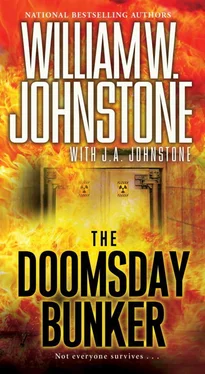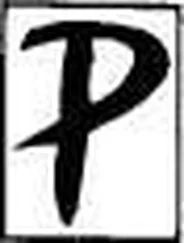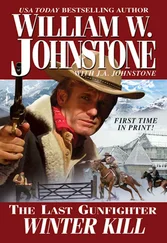Larkin grimaced and asked, “What are you going to do?”
“Go down there and put a stop to it,” Fisher answered without hesitation.
Larkin glanced at his daughter and saw the worried frown on her face. Threadgill didn’t look too sure about this, either.
“Don’t you think that confronting them might just make things worse? They stand around and shake their fists in the air and yell a little, and it blows off steam.”
“Yelling and shaking their fists in the air like Hitler did? That didn’t work out very well, did it?”
Larkin winced this time. He said, “Don’t play the Hitler card, Chuck. You never win an argument by playing the Hitler card.”
“I’m not arguing,” Fisher snapped. “I’m telling you, as the director of security, what I’m going to do. I’d like for you to come along, Patrick, but if you don’t want to be part of the force anymore—”
“My dad didn’t say that, Mr. Fisher,” Jill put in.
Larkin wasn’t too happy about that, either. He could express his own opinion without his daughter having to stick up for him.
“Look, Chuck, I never said I wouldn’t go with you—”
Susan had come up beside him. She laid a hand on his shoulder and said, “Go where? What’s going on, Patrick?”
Larkin turned to look at her. “Charlotte Ruskin’s stirring up trouble again. She and her friends are staging some sort of rally downstairs, trying to convince people they can vote to replace Graham Moultrie.”
“How can they replace him? He’s the one who built this project.”
“That’s what I said, but—”
“The woman’s a danger,” Fisher broke in. “It’s our job to keep the peace, and she’s trying to disrupt it. Simple as that.”
In Larkin’s experience, not many things in life actually were simple if you took a close enough look at them. But Fisher had a point. Charlotte Ruskin’s actions were going to cause trouble. That trouble had to be dealt with.
“Fine,” he said. “Let’s go.”
“Get your gun.”
Fisher, Jill, and Threadgill were all wearing pistols. Larkin thought a display of force like that might just aggravate the situation, but on the other hand, they would probably be outnumbered by quite a bit and just the presence of some firepower might keep things from getting out of hand.
“All right,” he said. “Give me a minute.”
His holstered .45 was on the table next to the sofa where he and Susan had been sitting as they watched TV. He got it and snapped the holster onto his belt. When he returned to the door, he found Susan and Jill standing there talking quietly. Fisher and Threadgill had moved off across the little foyer and into the elevator.
Susan put her hand on Larkin’s arm and said in a voice low enough that the other two men wouldn’t overhear, “I don’t like this very much, Patrick.”
“Neither do I. If Fisher gets too gung-ho, Ruskin and her people can turn it around and use it against us. We’re the ones who’ll come off looking like Nazis.”
“Maybe we can keep things tamped down enough it won’t come to that,” Jill suggested.
“That’s what I’m hoping,” Larkin said. “Come on, kid.”
The four of them took the elevator down one level, which let them out into the foyer in front of Jim and Beth Huddleston’s apartment. Larkin had seen both of the Huddlestons fairly often since they’d been down here, although the two families didn’t really socialize, just as they hadn’t when they’d been next-door neighbors up on the surface. Jim, given his restaurant experience, worked as a supervisor in the kitchen while Beth taught in the school.
Right now, the two of them were just coming out of their apartment as Larkin and his companions emerged from the elevator. Huddleston must have been able to tell from their grim faces that something was wrong, because he said, “Whoa. What’s going on?”
Fisher said, “We’re going to put a stop to some sort of rally Charlotte Ruskin’s holding this evening.”
Immediately, Beth said, “You can’t do that. We still have rights. What about freedom of assembly?”
“Are the two of you going to it?” Fisher asked, his voice sharp with suspicion.
“As a matter of fact, no,” Huddleston said, his tone conciliatory as always. With a wife like Beth, he had gotten used to smoothing over rough patches. “We’re on our way to a friend’s place over in Corridor Two for dinner.”
“But you can’t just barge in on a meeting, start waving guns around, and break it up,” Beth said. “That’s not right.”
Although Larkin would never admit it to her, this was one of the rare times he sort of agreed with Beth. He said, “We’re going to monitor the rally. There shouldn’t be any need for us to take action unless some sort of trouble breaks out.”
Fisher frowned, as if he wanted to say that Larkin didn’t have the authority to make that statement, but he kept his mouth shut. He had never been acquainted with Beth Huddleston before the war, but like anyone else who came in contact with her, he had learned quickly that it was a waste of time and energy to argue with her. Her opinions were as unmovable as if they’d been encased in a hundred tons of concrete.
“You need to be careful not to violate anyone’s rights,” Beth snapped.
“We’ll do our best,” Larkin said.
Beth sniffed, making it clear she thought their best was none too good. She and her husband went into the elevator. As the door slid closed with them behind it, Fisher said, “That man must have the patience of a saint.”
“Actually, he’s kind of a jerk part of the time,” Larkin said. “He was obsessed with his businesses and always hustling to make more money. That’s not necessarily a bad thing, but I’m not sure he ever thought about anything else.” Larkin shrugged. “It didn’t wind up doing him much good in the long run, did it?”
They followed a short hallway from the silo to a metal door with a push bar on it that opened into the vast, barracks-like lower level bunker. The walls were lined with tiers of bunk beds, while rows of single bunks were laid out to cover more than half of the floor space. Short partitions around groups of bunks provided a semblance of privacy. A common area in the center of the bunker had comfortable furniture, computer stations, a snack bar, and other amenities. Showers and restrooms were located at each end of the bunker. Back when he was still in the Corps, Larkin had once had cause to visit a federal minimum-security prison, and this bunker reminded him of that more than anything else.
A few people were in their bunks, but most of the residents who lived down here, plus some from the corridors and the silos, had crowded into the central common area. A lot of talk was going on, but nobody was making any speeches—yet.
Fisher looked around, his head jerking from side to side. Larkin knew he was trying to locate Charlotte Ruskin.
“I don’t see her,” Fisher said after a moment. “She’s bound to be around here somewhere, though.”
“Maybe she’s changed her mind,” Jill suggested.
Fisher snorted in disbelief. Then he bobbed a curt nod toward one of the stairways leading down from the corridors.
“Here she comes. And she’s got her entourage with her.”
Charlotte Ruskin was descending the stairs with Jeff Greer beside her. Chad Holdstock and three other men followed them. What Holdstock and his companions were carrying made Larkin stiffen in alarm.
Fisher noticed, too, and exclaimed, “They’ve got guns! They’re not supposed to be armed unless they’re on one of the ranges, practicing.”
The four men had pump shotguns in their hands. As that fact soaked into Larkin’s brain, he said, “It’s just for show. They can’t fire those down here without hurting a lot of innocent people. They’re probably not even loaded.”
Читать дальше









